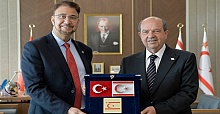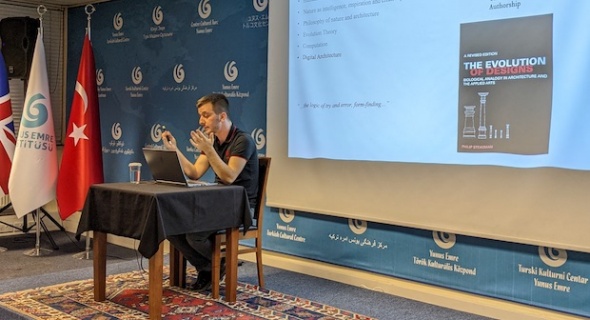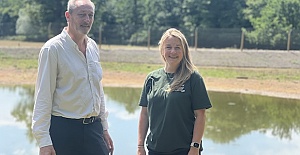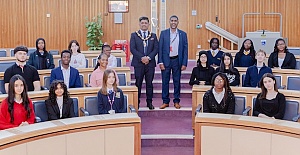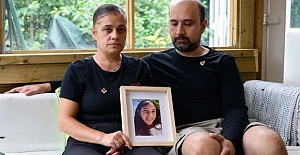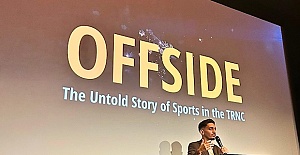Hosting the UCL Architecture and Digital Theory programme PhD candidate Melih Kamaoğlu the talk focused on “Philosophy of Nature and Architecture in the Age of Computation”.Yunus Emre Institute London was delighted to host another striking talk for the 22nd session of the Young Scholar Seminar Series, on Tuesday 29th November 2022 at 7 pm.In this talk the Melih Kamaoğlu examined how architects have used computation to reflect their philosophy of nature in architectural design after the 1990s.
Kamaoğlu started his talk by explaining how natural philosophy affected architecture in different periods, from ancient Greece to the renaissance. He talked about the main aim of the research by showing how different concepts of nature are simulated computationally and are used as design methods by architects. He focused on the theoretical and historical backgrounds and explained the critical limits and working principles of architectural design models. He also provided intellectual framework for explaining fundamental knowledge transfer between philosophy of nature, computation, and architecture.
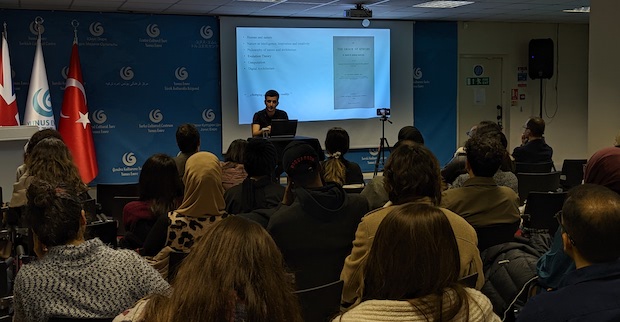
In the second part of his talk, he focused on how the introduction of computers into our lives changed the perspective of humanity in understanding the universe and nature much more deeply. Kamaoğlu gave examples on how architects used calculation to reflect their natural philosophies on architectural design after the 1990s.
Emphasizing two key points in his talk, Kamaoğlu stated that the first key point was the development of natural sciences in the same period as the development of computer technologies in the 1930s. According to him, while nature was thought to be a fixed constant prior to the 19th century, it has now been revealed that the evolutionary process in the 20th century is also changing and transforming.
Talking about the changes in the science of genetics as the second turning point, the young scholar analysed how the beginning of understanding nature at the level of the cell deeply affected the field of architecture.
In the final section of his talk, Kamaoğlu discussed the architecture after 2010 and the solutions found by architects to find answers by simulating natural processes on the computer and how to integrate these processes directly into architectural design.
In conclusion, the talk provided an intellectual framework for explaining the fundamental knowledge transfer between natural philosophy, computation and architecture. The participants found the talk to be inspiring in terms of illustrating how a human body is formed from a cell, and how architects are inspired by looking at the background of the process that creates the living thing. After the talk, the participants also had the opportunity to ask questions regarding how architecture goes beyond building design.
The evening concluded with a Q&A session with the speaker, and traditional Turkish Refreshments were served to the guests.
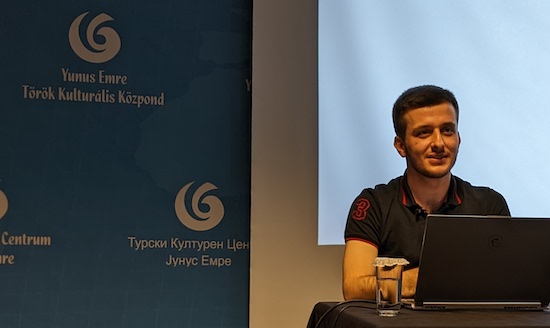
Yunus Emre Enstitüsü London
Yunus Emre Institute (Turkish: Yunus Emre Enstitüsü) is the Republic of Turkey’s cultural institute. Established in 2007, the organisation has over 60 branches worldwide. Through cultural diplomacy, the Institute aims to increase awareness of Turkish culture, support the learning of the Turkish language and to stimulate greater exchange in the fields of arts, culture, science, education. Since opening its doors in London in 2010, Yunus Emre Institute has become an improving the bonds of friendship between Turkey and the United Kingdom.


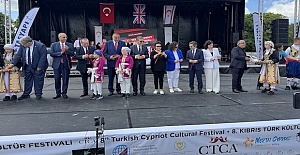 CTCA UK Condemns the Political Forcing Out of Afzal Khan MP for Engaging with Turkish Cypriots
CTCA UK Condemns the Political Forcing Out of Afzal Khan MP for Engaging with Turkish Cypriots Tatar: “Reaction to MP’s TRNC visit is yet another stark example of the Greek Cypriot leadership’s primitive and domineering mentality”
Tatar: “Reaction to MP’s TRNC visit is yet another stark example of the Greek Cypriot leadership’s primitive and domineering mentality”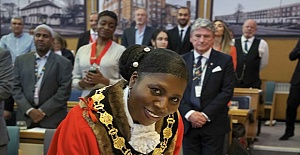 Margaret Greer has been sworn in as the new Mayor of Enfield
Margaret Greer has been sworn in as the new Mayor of Enfield Prime Minister Keir Starmer's 2025 Easter message
Prime Minister Keir Starmer's 2025 Easter message Team Enfield ranks fifteenth the in London Youth Games
Team Enfield ranks fifteenth the in London Youth Games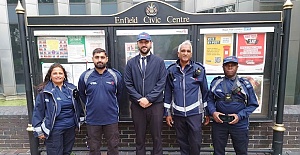 Parking enforcement boosted with more officers on patrol in Enfield
Parking enforcement boosted with more officers on patrol in Enfield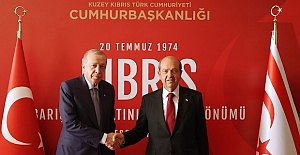 Ersin Tatar meets with President Erdoğan
Ersin Tatar meets with President Erdoğan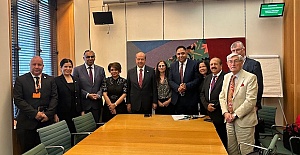 President Ersin Tatar Holds Ministerial-Level Meeting with UK Minister for Europe
President Ersin Tatar Holds Ministerial-Level Meeting with UK Minister for Europe UEFA Europa League and UEFA Conference League draws to be combined into one single show
UEFA Europa League and UEFA Conference League draws to be combined into one single show EuroLeague schedule for 2025-26 season announced
EuroLeague schedule for 2025-26 season announced Zeynep Sonmez becomes first Turkish tennis player to reach third round at Wimbledon
Zeynep Sonmez becomes first Turkish tennis player to reach third round at Wimbledon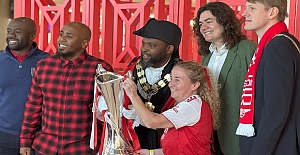 European champions Arsenal Women will play all of their league matches at the Emirates Stadium
European champions Arsenal Women will play all of their league matches at the Emirates Stadium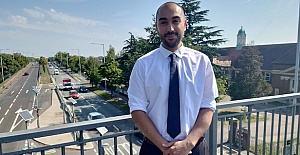 Enfield Labour welcomes the completion of A10 average speed cameras extension.
Enfield Labour welcomes the completion of A10 average speed cameras extension. TfL opens 2025 grants for community groups to encourage more walking, cycling and active travel in the capital
TfL opens 2025 grants for community groups to encourage more walking, cycling and active travel in the capital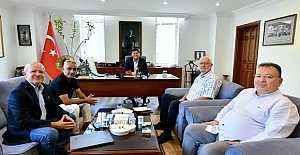 Fethiye Launches International Digital Tourism Campaign with UK-Based Publisher
Fethiye Launches International Digital Tourism Campaign with UK-Based Publisher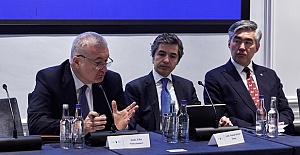 Highlights from the 3rd Trans-Caspian Connectivity Conference in London
Highlights from the 3rd Trans-Caspian Connectivity Conference in London

